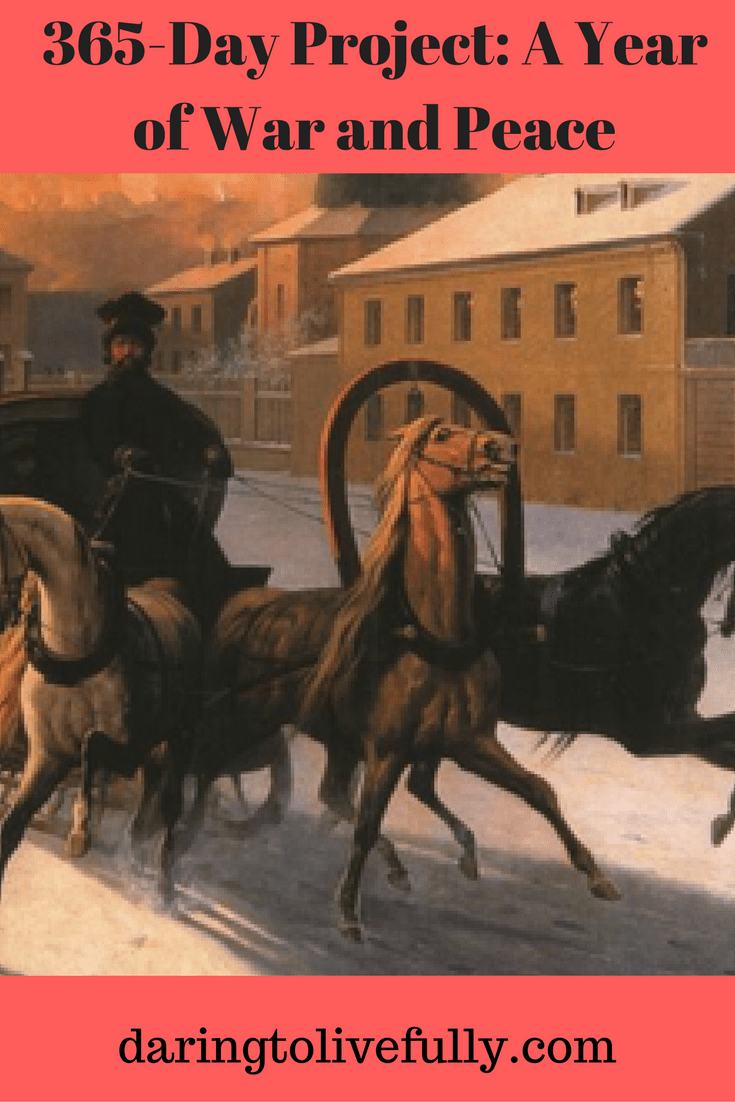
Read Leo Tolstoy’s magnificient novel, “War and Peace”, in 2017.
At the beginning of each New Year many people set resolutions. However, there are those who would rather skip the resolutions, while still finding a way to commemorate the New Year. That’s why a couple of years ago I published a blog post setting forth 10 alternatives to New Year’s resolutions.
One of these alternatives was starting a 365-day project. For a 365-day project you pick something that you’re going to do every single day of the New Year. The project can be in any life area, including fitness, creativity, family, and so on.
For example, you could decide to take a photograph every day for a year; create a sketch every day for a year; or read a bedtime story to your child every day for a year.
A good 365-day project has the following characteristics:

- It’s something that you really want to do. Your project isn’t another chore on your to-do list; it’s something that gets you excited and that you look forward to doing each day.
- You should be very specific about the action that you’re going to take. In fact, the more specific, the better. For example, “Take a photograph every day for a year” is very broad. Something much more specific would be: “Follow along with this calendar containing 365 photo prompts.”
- The action should be small enough that you can realistically carry it out every day for a year.
- Decide when you’re going to carry out the action for your 365-day project. As an illustration, if you decide to walk for 20 minutes every day for a year, you could decide that you’re going to go out for a walk immediately after having lunch each day.
- Find a way to keep track of your project and hold yourself accountable.
With all of that in mind, this year I propose that you read Leo Tolstoy’s epic novel, “War and Peace”, by reading one chapter of the novel every day of 2017. It so happens that the novel contains 361 chapters. Isn’t that convenient?
Why Read “War and Peace”?
Why should you read Tolstoy’s “War and Peace”? Here are ten reasons why:
- Reading has many benefits, including stress reduction, becoming more socially adept, and learning about other cultures. There’s even a Yale study that shows that people who read live longer than people who don’t.
- “War and Peace” is the second-best novel ever written (right after “Don Quixote” by Miguel de Cervantes).
- It’s an enjoyable read. Let’s face it, there are some classics that you have to plod your way through. This is not so with “War and Peace”, which is highly entertaining. This novel has remarkable characters, incredible love stories, and great explorations of life and death. Also, the writing is fantastic.
- Reading “War and Peace” will give you an amazing sense of accomplishment. Just like running a marathon is a status symbol for runners, reading “War and Peace” is a status symbol for book and culture lovers.
- You’ll learn some history—the novel chronicles the lives of five Russian aristocratic families affected by the Napoleonic Wars in the early 19th century.
- Even if you fail at every other goal that you set this year (which I’m sure you won’t), by December 31st 2017 you’ll be able to say: “I’ve read ‘War and Peace’”.
- It will further prove to you that you can take a very large, seemingly insurmountable goal and achieve it by breaking it down into tiny pieces and then tackling one tiny piece each day. After all, “War and Peace” is a book of prodigious length – it’s roughly 1300 pages long. However, each chapter is, on average, four pages long. Reading four pages a day is highly doable.
- It will strengthen your discipline muscles—by reading your daily chapter each day you’ll be flexing and strengthening your discipline and follow-through muscles.
- It will make you more interesting. Just think, at the next cocktail party you attend, when people ask what you’re reading, you get to say that you’re reading one of the most important works of literature. And Russian literature, nonetheless. That’s very interesting, and very sexy.
- When you’re done reading the book you get to watch a great adaptation of War and Peace — the 1967 Soviet film directed by Sergei Bondarchuk (it’s in Russian with English subtitles). It took five years to make this film–which had the full backing of the Soviet government–, at a cost of $100,000,000 and with a cast of 120,000. In addition, jewelry, furniture, and clothing from the period were borrowed from museums to make everything as authentic as possible.
How to Structure Your 365-Day Project
Should you decide to take this 365-day challenge, here’s what to do:
- Find a copy of “War and Peace” to read. You can buy this one on Amazon, or read it for free on Project Gutenberg. In addition, it’s very likely that you already have a copy of the novel somewhere in your house, or that a friend or family member has a copy that they can lend you.
- Decide when you’re going to set aside ten to twenty minutes each day to read the day’s chapter. You can decide to read as you drink your morning coffee, read during your work commute, read right after lunch, or read before going to bed at night.
- You can follow along with Brian E. Denton who will be writing a brief reflection of each chapter of “War and Peace” every day of this year on Medium (he’s been reading “War and Peace” every year, for the past seven years, by following the one-chapter-a-day approach).
- Decide how you’re going to keep track of your project’s progress. You can decide to send out a tweet each day and keep all of your followers updated on your progress; you can keep a log in which you write a one-sentence summary of each chapter; or you can simply mark an “X” on your calendar for every day in which you read a chapter.
Conclusion
I’ve already read “War and Peace”, but I’m reading it again this year by following the process I’ve described in this post. That is, by reading one short chapter each day. I hope I’ve encouraged you to do the same.
Live your best life by launching a 365-day project and reading “War and Peace”, one chapter at a time.


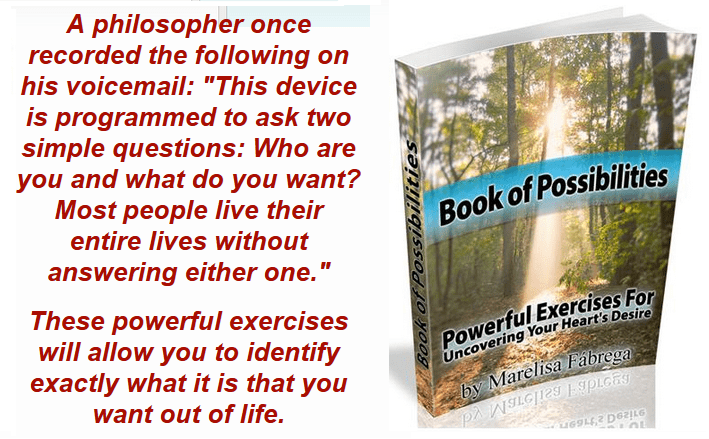
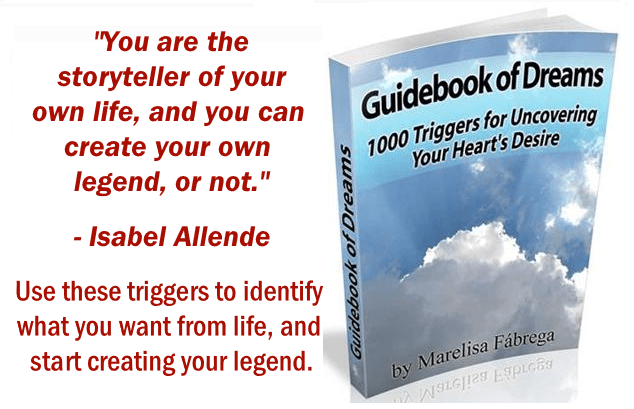
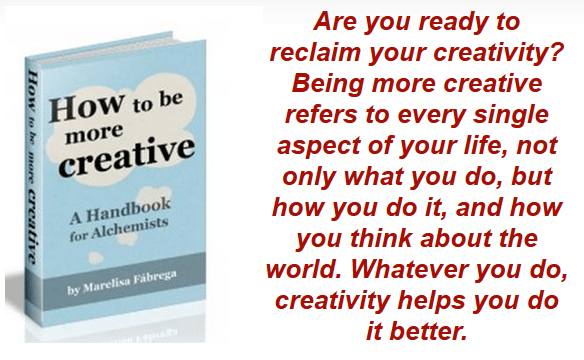
Related Posts:
- How to Read Hamlet
- 17 Must-Read Books by the Ancient Greeks
- How to Be Well Read
- 50 Characteristics of An Educated Person
- 20 Ways to Become More Cultured
Did you enjoy this article? Subscribe to “Daring to Live Fully” by clicking here and get free updates.


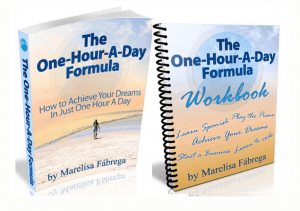

 Marelisa Fabrega is a lawyer and entrepreneur. She holds a Bachelor of Science in Business Administration from Georgetown University in Washington, D.C., as well as a Juris Doctor from the Georgetown University Law Center. You can learn more about her
Marelisa Fabrega is a lawyer and entrepreneur. She holds a Bachelor of Science in Business Administration from Georgetown University in Washington, D.C., as well as a Juris Doctor from the Georgetown University Law Center. You can learn more about her 





